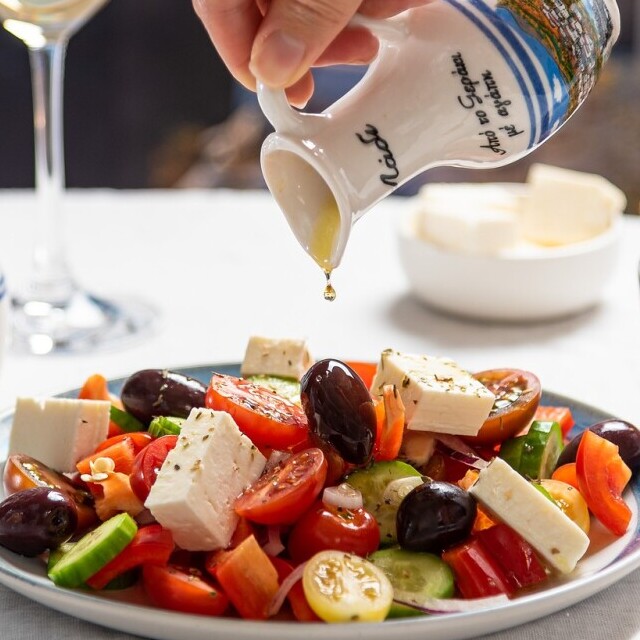I was talking to a friend who went to Crete, and she told me she was sitting at a small café one day, watching an elderly couple at the next table. They shared a simple meal – fresh fish, vegetables glistening with olive oil, and a slice of rustic bread. What struck her wasn’t what they were eating but how they were eating it: slowly, conversationally, with a pleasure that seemed to extend beyond the food itself.
This glimpse into the Mediterranean way of eating made me wonder: is there something more to this than just delicious food?
As it turns out, science has been asking the same question for decades. What started as a casual observation about the surprising health of post-war Mediterranean populations has evolved into one of the world’s most thoroughly researched dietary patterns.
What Is the Mediterranean Diet?
The Mediterranean diet’s roots wind through history, right back to the sun-soaked shores of the Mediterranean Sea, where ancient peoples savored their meals with a focus on natural produce, lean proteins, and healthy fats. Unlike many modern diets that have popped up and fizzled out, this one has been a part of life for centuries, providing a solid foundation for good living.
The Mediterranean Diet isn’t a “diet” in the restrictive sense we’ve come to associate with the word. Rather, it’s a lifestyle approach based on the traditional foods and eating patterns of countries bordering the Mediterranean Sea.
At its heart, the Mediterranean diet consists of:
- Abundant plant foods (fruits, vegetables, whole grains, legumes, nuts, and seeds)
- Olive oil as the primary source of fat
- Moderate amounts of dairy, fish, and poultry
- Limited red meat
Beyond the food itself, there’s the how: meals are shared with others, prepared with care, and eaten without a rush. This social component may be part of the health equation, not just cultural window dressing.
Mediterranean Diet Benefits: What Science Says

The landmark PREDIMED study1, published in the New England Journal of Medicine, followed over 7,000 participants at high risk for heart disease. Those assigned to a Mediterranean diet supplemented with either extra-virgin olive oil or nuts had a remarkable 30% lower risk of major cardiovascular events than those on a low-fat diet.
The Mediterranean diet offers a wide range of health benefits backed by scientific studies. Here’s why so many experts recommend it for long-term health and wellness:
- Heart disease protection: The diet’s powerhouse ingredients bring heart-loving nutrients like omega-3s from fish and healthy monounsaturated fats from olive oil, significantly reducing cardiovascular risks.
- Brain protection: A 2020 analysis2 found that higher adherence to the Mediterranean diet was associated with better cognitive function and lower risk of cognitive impairment and Alzheimer’s disease.
- Longer lifespan: Studies3 of Blue Zones (areas where people live significantly longer than average) consistently find Mediterranean-style eating patterns among these long-lived populations. The diet helps lower overall mortality rates.
- Mental health boost: A 2018 meta-analysis4 found that the Mediterranean diet was associated with reduced risk of depression. The diet is loaded with antioxidants and nutrients that keep the brain sharp.
- Diabetes management: Research5 showed that the diet can help prevent type 2 diabetes and improve glycemic control in those already diagnosed.
- Inflammation reduction: Multiple studies6 show that components of the Mediterranean diet help reduce inflammatory markers throughout the body.
- Sustainable weight management: Unlike restrictive fads, this approach focuses on nourishing the body with satisfying meals rather than denial, making it easier to maintain a healthy weight long-term.
What fascinates me most about this research is that these benefits aren’t linked to any single “superfood” or nutrient. It’s the pattern as a whole that creates the magic.
How to Eat Mediterranean: Simple Grocery List & Tips

If you’re wondering how to bring the Mediterranean approach into your kitchen, here are some practical starting points:
- Start with olive oil: Replace butter and vegetable oils with extra virgin olive oil for cooking and dressing.
- Plant-power your plate: Aim to fill at least half your plate with vegetables and fruits at each meal.
- Rethink protein: Use fish, poultry, beans, and nuts as your primary protein sources, limiting red meat to occasional meals.
- Go whole: Choose whole grains like farro, bulgur, or whole wheat over refined grains.
- Start small: Make gradual changes instead of overhauling everything overnight. Swap butter for olive oil, or add some nuts to your salads.
- Stock key ingredients: Keep tomatoes, whole grains, garlic, herbs, and spices like oregano and basil on hand. Fresh fish is ideal, but canned tuna or salmon work well with tight time or budget.
- Snack Mediterranean-style: Keep nuts, fresh fruit, or a small amount of hummus with vegetables handy for between-meal hunger.
Real Stories of Transformation
The power of the Mediterranean diet isn’t just in scientific papers. It’s in the lives it changes. People worldwide have shared how embracing this lifestyle has revamped their health and happiness.
Take Sarah, who struggled with weight issues for years. She shed some weight and felt more energetic by switching to meals rich in colorful veggies, hearty grains, and flavorful spices. Instead of feeling restricted, she found a new zest for cooking and sharing meals with family, which became a joyous part of her day.
Then there’s Jason, who faced high cholesterol and constant fatigue. Slowly, he ditched processed snacks in favor of almonds and fresh fruit, incorporating fish and olive oil into his meals. Over time, his doctor noticed significant improvements, and his energy levels soared.
Mediterranean Mindfulness

Remember the “ping fatigue”? Our constant notifications and interruptions don’t just affect our productivity. They change how we eat. How many of us eat lunch while checking emails or scrolling through social media?
The Mediterranean approach offers a powerful antidote to our distracted eating culture. When I committed to eating Mediterranean-style, I also committed to eating more mindfully, sitting down at the table, focusing on my food, and, when possible, sharing the experience with others.
This mindfulness component might be one of the “secret ingredients” that makes this eating pattern so beneficial. Research suggests that mindful eating can help:
- Regulate appetite.
- Improve digestion.
- Increase meal satisfaction.
- Create deeper connections through shared meals.
- Turn eating from a rushed necessity into a pleasurable experience.
Mediterranean Diet Meal Plan: A Simple Guide for Beginners
If you’re wondering how to structure your meals, here’s a simple Mediterranean diet meal plan to get you started. These meals are balanced, easy to prepare, and packed with the core Mediterranean ingredients: fresh vegetables, whole grains, healthy fats, and lean proteins.
This plan focuses on flavorful, satisfying meals that nourish your body while staying true to Mediterranean traditions.
Day 1: A Classic Start
- Breakfast: Greek yogurt with honey, walnuts, and fresh berries.
- Lunch: Mediterranean chickpea salad with cucumbers, cherry tomatoes, feta cheese, and a lemon-olive oil dressing. Serve with whole grain pita.
- Dinner: Grilled salmon with roasted vegetables (zucchini, bell peppers, and eggplant) drizzled with olive oil and herbs.
- Snack: A handful of almonds and a piece of dark chocolate.
Day 2: Light & Fresh
- Breakfast: Whole grain toast with avocado, a drizzle of olive oil, and a sprinkle of feta cheese.
- Lunch: Mediterranean-style quinoa bowl with grilled chicken, arugula, olives, and sun-dried tomatoes. Toss with a lemon vinaigrette.
- Dinner: Lentil soup with garlic, tomatoes, and spinach, served with a side of rustic whole wheat bread.
- Snack: Fresh grapes with a handful of walnuts.
Day 3: Hearty & Satisfying
- Breakfast: Scrambled eggs with spinach and feta, served with whole wheat bread.
- Lunch: Tuna and white bean salad with arugula, olives, and a balsamic dressing.
- Dinner: Baked cod with olive oil, garlic, and cherry tomatoes, served with herbed quinoa.
- Snack: Hummus with sliced cucumbers and carrots.
The science convincingly shows that even partial adoption of Mediterranean patterns can bring significant health benefits. Each olive oil-dressed salad, a handful of nuts, or fish dinner is a step in a positive direction.
The most important Mediterranean wisdom is about approaching eating with joy, connection, and a sense of abundance rather than restriction. In our wellness-obsessed but paradoxically unhealthy culture, that might be the most revolutionary idea of all.
Have you tried incorporating Mediterranean eating patterns into your life? What challenges or successes have you encountered? I’d love to hear about your experiences in the comments below.
About the Author
Carla Picolli is a psychologist, sleep expert, author, and mental health advocate. With over two decades of experience in mental health and wellness, Carla helps individuals build sustainable habits for a healthier, happier life.
*This article is for informational purposes only and does not constitute medical advice. If you have concerns about your health, well-being, or sleep, please consult a healthcare professional for personalized guidance.
References:
1. https://nutritionsource.hsph.harvard.edu/healthy-weight/diet-reviews/mediterranean-diet/
2. https://pmc.ncbi.nlm.nih.gov/articles/PMC2997798
3. https://pmc.ncbi.nlm.nih.gov/articles/PMC6125071/
5. https://www.sciencedirect.com/science/article/pii/S2667036423000043


I absolutely loved this deep dive into the Mediterranean diet! The emphasis on mindful eating and enjoying meals with others really stood out to me. It’s such a refreshing contrast to the rushed, distracted way many of us eat today. The real-life transformations were inspiring, and it’s fascinating how this lifestyle isn’t just about food but an overall approach to well-being. I’d love to try incorporating more Mediterranean meals into my routine, but I wonder what are some easy, budget-friendly swaps for someone just starting out?
I’m so glad you enjoyed the article, Kavitha! If you’re just starting out, budget-friendly swaps can make the transition easy and accessible. Here are a few simple changes:
Swap butter for olive oil in cooking and dressings.Use beans and lentils as affordable protein alternatives to meat.Choose canned or frozen fish (like sardines or salmon) instead of fresh seafood.Opt for seasonal produce and simple whole grains like oats, quinoa, or whole-wheat pasta.Incorporate herbs, garlic, and lemon to add flavor without extra cost.
Small steps can make a big difference! Have a great day!
The Mediterranean Diet is more than just a way of eating—it’s a lifestyle rooted in balance, tradition, and enjoyment. Carla’s article beautifully captures not only the health benefits of this dietary pattern but also its social and mindful approach to food. The research-backed evidence she presents, from heart health to longevity and mental well-being, highlights why experts consistently recommend this way of eating. I especially appreciate the focus on mindful eating and shared meals, which often get overlooked in modern diets. The meal plan and practical tips make it easy for anyone to start incorporating Mediterranean principles into their daily life. This article serves as a great reminder that food is not just about nutrition but also about connection, culture, and pleasure. Looking forward to trying some of these meal ideas!
I’m so glad you liked the article, Andre! The emphasis on shared meals and slowing down to enjoy food is a refreshing contrast to today’s fast-paced eating habits, and I love that you’re excited to try some of the meal ideas!
This post offers an engaging perspective on how a balanced, nutrient-rich diet can impact our overall health. I’m curious about ways to adapt these principles for those living outside Mediterranean regions, especially when local produce may not match traditional ingredients. What creative substitutions or strategies have you seen work best? Additionally, could you share insights on common challenges people encounter when transitioning to this eating style and how they might overcome them?
Thank you for your comment, Slavisa! You bring up such a great point, adapting the Mediterranean diet outside of Mediterranean regions can require some creativity, but the core principles remain the same: prioritizing whole, nutrient-dense foods, healthy fats, and a mindful approach to eating. For substitutions, some easy swaps include:
Olive oil alternatives: Avocado oil or canola oil (for cooking) and nuts/seeds for healthy fats;
Seafood alternatives: Canned fish (like sardines or tuna) or locally available lean proteins.
Fresh produce: Use frozen or canned vegetables (without added salt) when fresh isn’t available.
Whole grains: Swap Mediterranean staples like farro and bulgur for accessible options like brown rice, quinoa, or whole wheat bread.
Common challenges people face when transitioning include finding affordable options, adjusting to new flavors, and making gradual changes that stick. A great approach is to start small, swap one meal at a time, experiment with herbs and spices for flavor, and focus on balance rather than perfection. Over time, these adjustments feel more natural and sustainable.